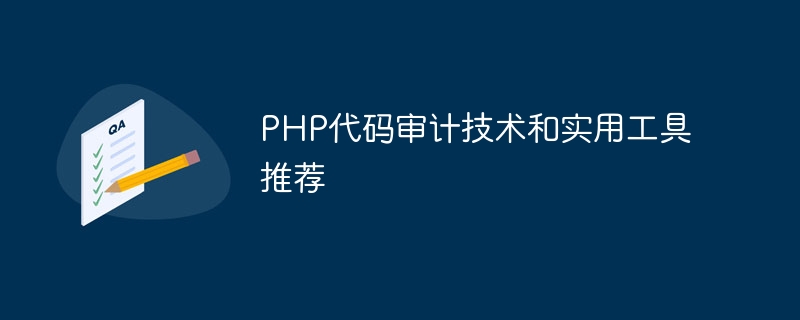
Recommended PHP code audit technology and practical tools
Overview:
With the rapid development of the Internet, website security issues have become increasingly prominent. As a language widely used in Internet development, PHP's code security audit has become a very important link. This article will introduce some basic techniques for PHP code auditing and recommend several practical tools.
1. Code audit technology
- Scanning sensitive functions
In PHP code auditing, the first thing you need to pay attention to is the use of sensitive functions. For example, the eval() function can execute any code passed in, so use it with caution. There are also functions such as system() and exec(), which also have security risks. By scanning the usage of sensitive functions, you can initially determine whether there are potential security issues in the code.
Sample code:
$code = $_POST['code'];
eval($code);
Copy after login
- Input filtering
Input filtering is also a very important part in PHP code auditing. By filtering user input, common security vulnerabilities such as SQL injection and XSS attacks can be effectively prevented. Commonly used input filtering methods include escaping HTML tags, prohibiting special characters, etc.
Sample code:
$name = $_GET['name'];
$name = strip_tags($name); // 过滤HTML标签
Copy after login
- Error handling
Error handling is another aspect that needs attention in PHP code auditing. A good error handling mechanism can improve the security and stability of the system. For example, shield the output of error messages, handle error exceptions appropriately, etc.
Sample code:
error_reporting(0); // 屏蔽错误信息的输出
Copy after login
- File upload
The file upload function is a module that many websites involve, and it is also a link that is easily targeted by attacks. When conducting PHP code audits, you need to pay attention to the location of uploaded files, file type and size restrictions, etc. Some security settings include disabling script execution, preventing directory traversal, etc.
Sample code:
$allowedTypes = array('jpg', 'png');
$uploadFile = $_FILES['file'];
$extension = strtolower(pathinfo($uploadFile['name'], PATHINFO_EXTENSION));
if (in_array($extension, $allowedTypes)) {
move_uploaded_file($uploadFile['tmp_name'], 'uploads/' . $uploadFile['name']);
}Copy after login
2. Recommended practical tools
- RIPS
RIPS is an open source tool that focuses on PHP code security auditing . It can perform static analysis on PHP code, detect security vulnerabilities in it, and provide detailed repair suggestions. RIPS has a user-friendly interface that helps developers quickly find problems in their code.
- PHP_CodeSniffer
PHP_CodeSniffer is a very practical code quality inspection tool in PHP development. It can help teams standardize coding style and can also be used to audit potential security issues in code. By defining custom rule sets, you can quickly locate security risks in your code.
- OWASP
OWASP (The Open Web Application Security Project) is an open community dedicated to protecting the security of web applications. It provides a variety of tools and resources to help developers conduct PHP code audits. For example, its Top 10 projects provide understanding and solutions to common web application security issues.
Conclusion:
PHP code audit is an important part of ensuring website security. When conducting code audits, we can use some basic auditing techniques, such as scanning sensitive functions, input filtering, error handling, and file uploading. At the same time, code auditing can be carried out more efficiently with the help of some practical open source tools, such as RIPS, PHP_CodeSniffer and OWASP. By continuously improving our auditing technology and utilizing practical tools, we are able to better ensure the security of our website.
The above is the detailed content of Recommended PHP code auditing techniques and practical tools. For more information, please follow other related articles on the PHP Chinese website!






